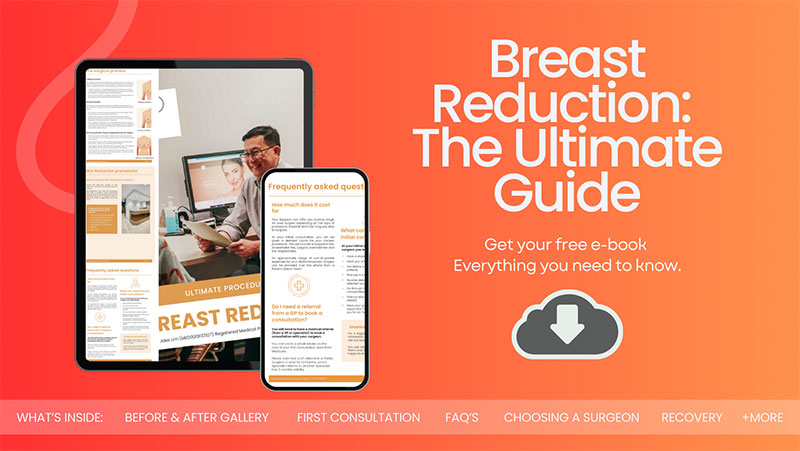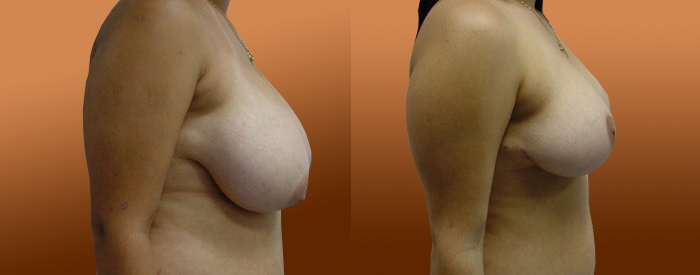Guide to Preparing for Your Breast Reduction Surgery
Breast reduction surgery, or reduction mammoplasty, is a procedure designed to remove excess breast fat, glandular tissue, and skin to achieve a breast size in proportion with your body and to alleviate the discomfort associated with overly large breasts. The benefits of this surgery extend beyond the physical, as studies suggest.
The journey to a successful breast reduction surgery (reduction mammoplasty) begins long before the actual procedure. Preparation is key, and Sydney Specialist Plastic Surgeon Dr Lim emphasises the importance of being thoroughly prepared for both the surgery and the recovery process. Proper preparation not only ensures a smoother surgery but also significantly impacts the speed and quality of recovery. In this blog, Dr Jake Lim will offer recommendations on how to prepare for your breast reduction surgery (reduction mammoplasty), covering everything from the initial consultation to the night before your procedure.
Download Dr Lim’s Free 2024 Breast Reduction Surgery Guide (Reduction Mammoplasty)

What Is Breast Reduction (Reduction Mammoplasty) Surgery
Symptoms such as chronic back, neck, and shoulder pain, skin irritation beneath the breast crease, and restricted physical activity can be alleviated, if not entirely resolved, through this surgery. The procedure itself involves the removal of excess breast tissue and skin, reshaping the breast to a size that’s more proportionate to the body. It can also involve repositioning the nipple and areola to a more natural height. While the thought of surgery can be daunting, understanding what it entails can help alleviate fears and set realistic expectations.
Common Reasons for Opting for Breast Reduction:
- Physical discomfort: Chronic pain in the back, shoulders, and neck, as well as skin irritation and indentations from bra straps, are common complaints.
- Limited physical activity: Large breasts can hinder the ability to participate in physical activities, affecting overall health and lifestyle.
Potential Benefits and Risks:
The benefits of breast reduction surgery (reduction mammoplasty) are numerous, including relief from physical discomfort, enhanced ability to engage in physical activities, improved body image, and a broader range of clothing options. However, as with any surgical procedure, there are risks involved. These can include reactions to anaesthesia, infection, changes in nipple or breast sensation, and scarring. Dr Lim ensures that all patients are fully informed of both the benefits and potential risks, allowing for a well-considered decision to proceed with the surgery.
Initial Steps to Prepare for Reduction Mammoplasty
Embarking on the journey of breast reduction surgery with Dr Jake Lim begins with a series of initial steps designed to ensure that you are fully prepared for the procedure, both physically and mentally. These preparatory steps are crucial for a successful surgery and a smooth recovery process. Let’s get into the essential initial steps you need to take when preparing for your breast reduction surgery (reduction mammoplasty):
Consultation
The first and perhaps most critical step in your preparation is the consultation with Dr Lim. This initial meeting is more than just a formal introduction; it’s an opportunity for Dr Lim to understand your goals, concerns, and expectations regarding the surgery. During the consultation, Dr Lim will review your medical history, conduct a physical examination, and discuss the desired outcome of the surgery. This is the perfect time to ask any questions you may have about the procedure, recovery, and expected results. Dr Lim will also explain the surgical technique that will be used, tailored to your specific needs and body type.
Medical Evaluation
Following the consultation, a comprehensive medical evaluation is necessary to ensure you are a suitable candidate for breast surgery. This evaluation may include blood tests, a mammogram, and other diagnostic tests to assess your overall health status. Dr Lim will review your current medications, including over-the-counter drugs, supplements, and herbal products, as some of these may need to be adjusted or discontinued prior to surgery. It’s important to disclose any history of breast cancer in your family or personal health history, as this could influence the surgical approach and post-operative care.

Lifestyle Changes
To optimise your health and ensure the best possible outcome, Dr Lim may recommend several lifestyle changes in the weeks leading up to your surgery. These changes are designed to fortify your body, minimise the risk of complications, and enhance the healing process.
A balanced, nutritious diet plays a vital role in preparing your body for surgery and recovery. Dr Lim may suggest increasing your intake of proteins, vitamins, and minerals, which are essential for wound healing and immune function. Staying hydrated is also crucial, as proper hydration promotes overall health and aids in recovery.
Smoking and alcohol consumption can significantly impair your body’s ability to heal and increase the risk of complications during and after surgery. Dr Lim strongly advises quitting smoking and avoiding alcohol for at least a few weeks before and after the procedure to ensure optimal healing.
Certain medications, especially those that can affect blood clotting, such as aspirin, anti-inflammatory drugs, and some herbal supplements, may need to be temporarily discontinued. Dr Lim will provide specific instructions regarding which medications to stop or continue and when to do so.
Dr Jake Lim’s Pre-Surgery Recommendations
As the date of your breast reduction surgery (reduction mammoplasty) with Dr Jake Lim approaches, adhering to a set of pre-surgery recommendations is essential for ensuring a successful procedure and optimal recovery. These recommendations are designed to prepare your body and mind for the changes ahead, minimise potential complications, and facilitate a smooth healing process. Let’s explore these pre-surgery guidelines in detail:
Lifestyle Adjustments
Dietary Modifications
A well-balanced diet plays an important role in preparing your body for surgery and aiding in the recovery process. Dr Lim emphasises the importance of consuming foods rich in vitamins and minerals, particularly those that support wound healing and boost the immune system. Foods high in vitamin C (such as citrus fruits, berries, and leafy greens), vitamin A (found in sweet potatoes, carrots, and spinach), and zinc (present in nuts, seeds, and meat) are particularly beneficial. Protein is also essential for repair and recovery, so incorporating lean meats, fish, beans, and legumes into your meals is recommended. Hydration is equally important; drinking plenty of water helps maintain optimal health and facilitates healing.
Smoking Cessation and Alcohol Restriction
Nicotine and alcohol can significantly impair your body’s healing capabilities, increasing the risk of complications during and after surgery. Smoking can constrict blood vessels, reducing blood flow to the surgical site and delaying the healing process. Alcohol consumption can affect your liver function and your body’s ability to clot blood. Dr Lim strongly advises patients to quit smoking and avoid alcohol for at least 6-8 weeks before and after surgery to ensure the best possible outcomes.
Physical Activity
Engaging in regular, moderate exercise before surgery can improve your physical health, enhance blood circulation, and boost your mental well-being. However, it’s important to avoid strenuous activities that might strain your chest area as your surgery date nears. Dr Lim can provide personalised advice on suitable exercises and when to taper off before the procedure.

Mental and Emotional Preparation
Setting Realistic Expectations
Understanding the realistic outcomes of breast reduction surgery is vital. While Dr Lim will strive to achieve your desired results, it’s important to have a practical perspective on what the surgery can and cannot do. Discussing before-and-after photos of similar cases with Dr Lim can help set achievable expectations.
Emotional Support
The support of family and friends is invaluable both before and after your surgery. Consider discussing your feelings and any anxieties with loved ones or a professional counsellor. Having a support system in place can ease the emotional journey and provide practical help during your recovery.
Practical Arrangements
Preparing Your Home
Creating a comfortable, stress-free recovery environment at home is essential. Before your surgery, arrange your living space so that everything you need is easily accessible. This might include setting up a recovery area with pillows for elevation, preparing meals in advance, and ensuring that essential items are within reach without the need to stretch or bend.
Arranging for Assistance
You will need someone to drive you home after the surgery and ideally stay with you for the first few days during your recovery. Assistance with daily tasks, such as cooking, shopping, and personal care, can significantly ease your recovery process.
Financial Planning
Understanding the costs involved in your breast reduction surgery and any associated expenses, such as medications and post-surgery garments, is important. If you have health insurance, verify what aspects of the procedure are covered. Planning for these expenses in advance can alleviate financial stress, allowing you to focus on your recovery.
The Night before and the Day of the Surgery
Dr Lim will provide specific instructions regarding fasting before your surgery. Typically, you will be asked to refrain from eating or drinking anything, including water, after midnight on the night before your procedure.
Shower with antibacterial soap the night before or the morning of your surgery, as advised by Dr Lim. Avoid applying lotions, perfumes, or deodorants to the surgery area. Dress in comfortable, loose-fitting clothing that does not need to be pulled over your head.
Prepare a bag with essentials you might need for your hospital stay or on your way home. This could include your ID, insurance information, medications, a comfortable change of clothes, and any personal items Dr Lim has recommended bringing.
FAQs about How to Prepare for Your Breast Reduction Surgery

How long before my breast reduction surgery (reduction mammoplasty) should I start preparing?
- It’s advisable to start preparing for your breast reduction surgery (reduction mammoplasty) at least 4-6 weeks in advance. This timeframe allows you to make necessary lifestyle adjustments, such as improving your diet, quitting smoking, and reducing alcohol intake, which can significantly impact your surgery and recovery process. Starting early also gives you ample time to arrange for practical matters like post-surgery care and home preparation.
Can I continue taking my regular vitamins and supplements before surgery?
- You should discuss all vitamins and supplements you’re taking with Dr Lim during your consultation. Some vitamins and supplements, especially those that can affect blood clotting (such as Vitamin E, omega-3 fatty acids, and certain herbal supplements like ginkgo biloba), may need to be paused before surgery. Dr Lim will provide specific instructions based on your individual health profile and the supplements you’re taking.
Is it necessary to have someone stay with me after my surgery?
- Yes, it is highly recommended to have someone stay with you for at least the first 24-48 hours after your surgery. During this initial recovery period, you may experience grogginess from the anaesthesia, and your mobility will be limited. Having someone available to assist you with personal care, medication management, and emergency situations is crucial for your safety and comfort.
What should I wear on the day of my surgery?
- On the day of your surgery, wear loose, comfortable clothing that is easy to put on and take off. Ideally, choose a top that zips or buttons up the front so you don’t have to pull it over your head after the surgery. Soft, slip-on shoes are also recommended to avoid bending over. Comfort is important, as you will be going home in these clothes after the procedure.
How can I manage my anxiety leading up to the surgery?
- It’s normal to feel anxious before undergoing surgery. To manage pre-surgery anxiety, engage in stress-reducing activities such as deep breathing exercises, meditation, or gentle yoga. Discussing your feelings with Dr Lim, a counsellor, or a support group can also provide reassurance and reduce anxiety. Additionally, focusing on the positive outcomes of the surgery and having a clear understanding of the procedure and recovery process can help alleviate fears and concerns.
Further Reading about Breast Reduction with Sydney Specialist Plastic Surgeon Dr Jake Lim
- Read Dr Jake Lim’s Blog about Breast Reduction Surgery (Reduction Mammoplasty): Techniques and Approaches
- Read Dr Jake Lim’s Blog about Breast Reduction vs Breast Lift
- Read Dr Jake Lim’s Blog about Heavy Breasts and Breast Reduction (Reduction Mammoplasty) Surgery
- Read Dr Jake Lim’s Blog about Breast Reduction Complications (Reduction Mammoplasty)
- Read Dr Jake Lim’s Blog about Neck Pain and Breast Reduction (Reduction Mammoplasty)
- Read Dr Jake Lim’s Blog about Breast Reduction FAQs
Medical References about Breast Reduction Surgery (Reduction Mammoplasty)
- Breast reduction surgery – Mayo Clinic
- Breast Reduction Preparation – American Society of Plastic Surgeons
- Breast Reduction Surgery: An Overview – WebMD
- Breast Reduction Surgery: Everything You Need to Know
- Breast Reduction Consultation – American Society of Plastic Surgeons




